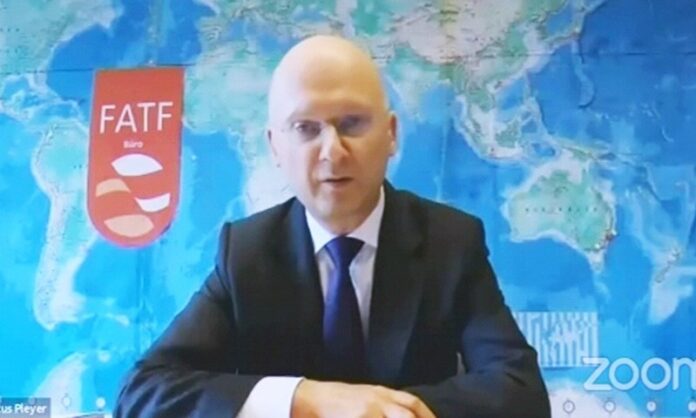The Financial Action Task Force has decided to keep Pakistan on its grey list as it is yet to fully implement the action plan.
The decision was taken as its five-day virtual meeting in Paris that started on June 21 concluded.
Announcing the decision, FATF President Dr Marcus Pleyer said, “Pakistan has made significant measures and it has largely addressed 26 out of 27 measures.”
Pleyer, however, added that the action plan on financial terrorism still needed to be addressed.
“In 2019, the regional partner of FATF identified problems in Pakistan’s anti-money laundering measures. But since then it has improved. There remains risk of money laundering and subsequently FATF had discussions with Pakistan.
“I want to thank the Pakistan government for their continued commitment to address the concerns and make the necessary changes they were asked to effect,” Pleyer said.
In its last presser following a plenary, on February 25, FATF President Dr Marcus Pleyer had said Pakistan remained under increased monitoring, adding that “while Islamabad has made significant progress, there remained some serious deficiencies in mechanisms to plug terrorism financing”.
The FATF plenary considered the report of Asia-Pacific Group on Pakistan. The APG, in its Mutual Evaluation Report (MER) on Pakistan released just weeks ago, had moved the country from enhanced (expedited) to enhanced follow-up list, Business Recorded reported.
The second follow-up MER on Pakistan uploaded by the AGP group on its website stated that overall, Pakistan has made notable progress in addressing the technical compliance deficiencies identified in its MER. Pakistan has been re-rated on 22 recommendations, and has been downgraded as non-compliant from partially compliant in one recommendation.
After adoption of MER, Pakistan was placed under Post Observation Period by the FATF, which expired in February 2021.
During the said period, Pakistan carried out major legal reforms with the enactment of 14 federal laws and three provincial laws along with relevant rules and regulations.
Pakistan submitted its report to the FATF on its Technical Compliance on October 1, 2020.
On Wednesday, Foreign Minister Shah Mahmood Qureshi said that the FATF had no justification to keep Pakistan on its grey list.
In a statement carried by Radio Pakistan, Qureshi said that Pakistan had completed the FATF’s technical requirements.
“We had been given 27 points in the FATF Action Plan, out of which work on 26 has been completed,” he said, adding that work was also being carried out to address the remaining item.
“In this situation, there is no justification to keep Pakistan on the grey list,” he said. He added that India wanted to use the forum for “political purposes” but should not be allowed to do so.
Pakistan has taken solid steps to curb money laundering and terrorist financing, he added.
In June 2018, FATF placed Pakistan on its list of “jurisdictions under increased monitoring” or grey list citing structural deficiencies, which, according to FATF, resulted in Pakistan’s failure to effectively combat terror financing and money laundering.
In February 2020, FATF expressed concerns over “Pakistan’s failure to complete its action plan in line with the agreed timelines and in light of the terrorist financing risks emanating from the jurisdiction.” Following this development, the global terror financing watchdog along with International Cooperation Review Group (ICRG) issued a 27-point Action Plan for Pakistan to address these structural deficiencies.
In October last year, FATF noted that Pakistan fully met the targets laid down in 21 of the 27 items of the Action Plan and asked the county to achieve full progress on the Action Plan by February 2021.
In February this year, FATF decided to keep Pakistan on its grey list, giving it four more months – June 20, 2021 – to complete its full action plan. It noted that Pakistan has made progress across all action plan items and it has now largely addressed 24 out of 27 items of the action plan.
More to follow





very informative information
Clearly the decision to keep Pakistan on FATF list is political, rather than based on facts. This is despite Pakistan having put in place stringent check & balances to identify and stop money laundering and terror financing. However the govt should take this as an opportunity to track and tax the undocumented sectors of the economy including doctors, lawyers, etc. and especially the real estate sector. The real estate sector is used to dump black / corruption money in the country. By documenting the sector we may be able to identify the black sheeps and plug the main tax leakage hole in FBR.